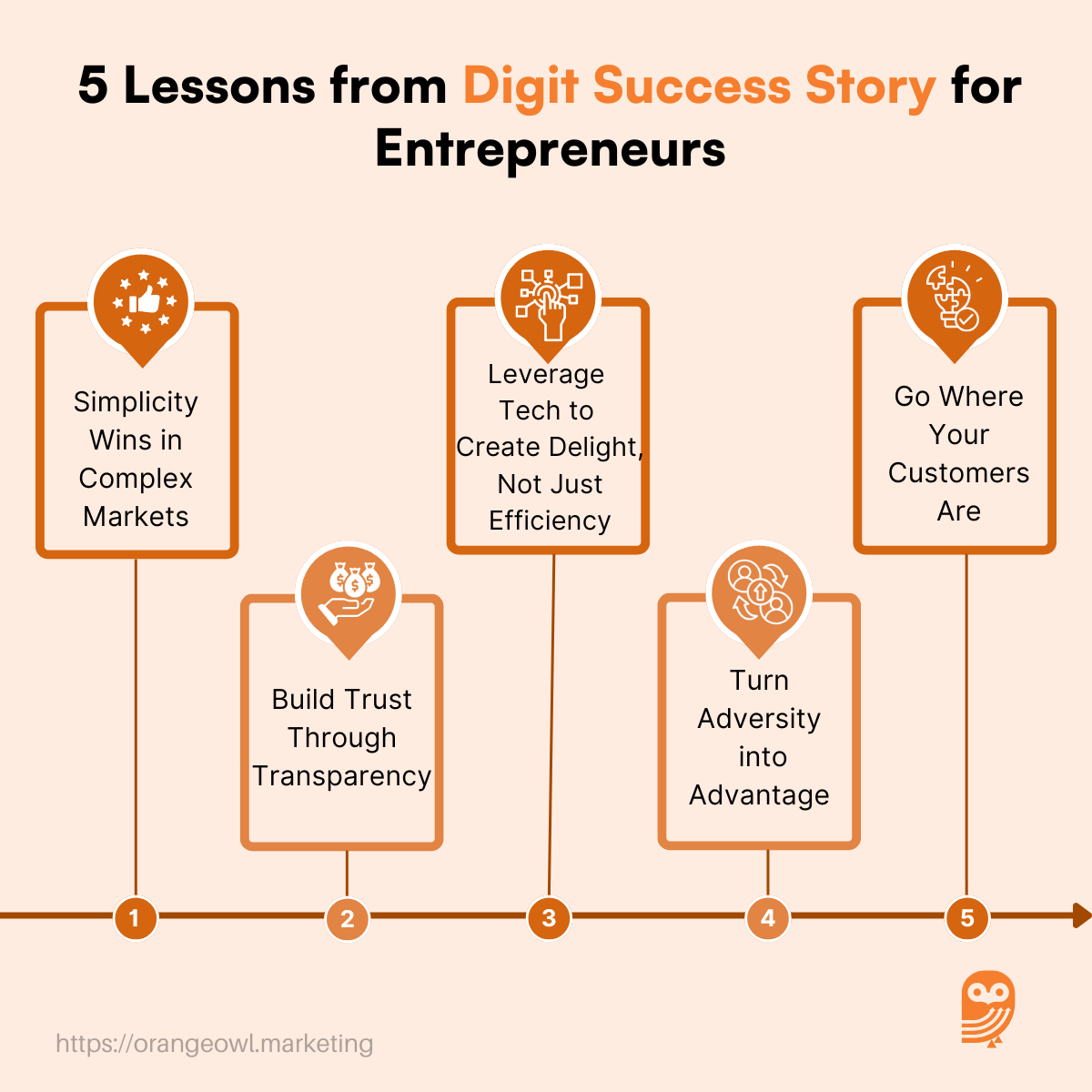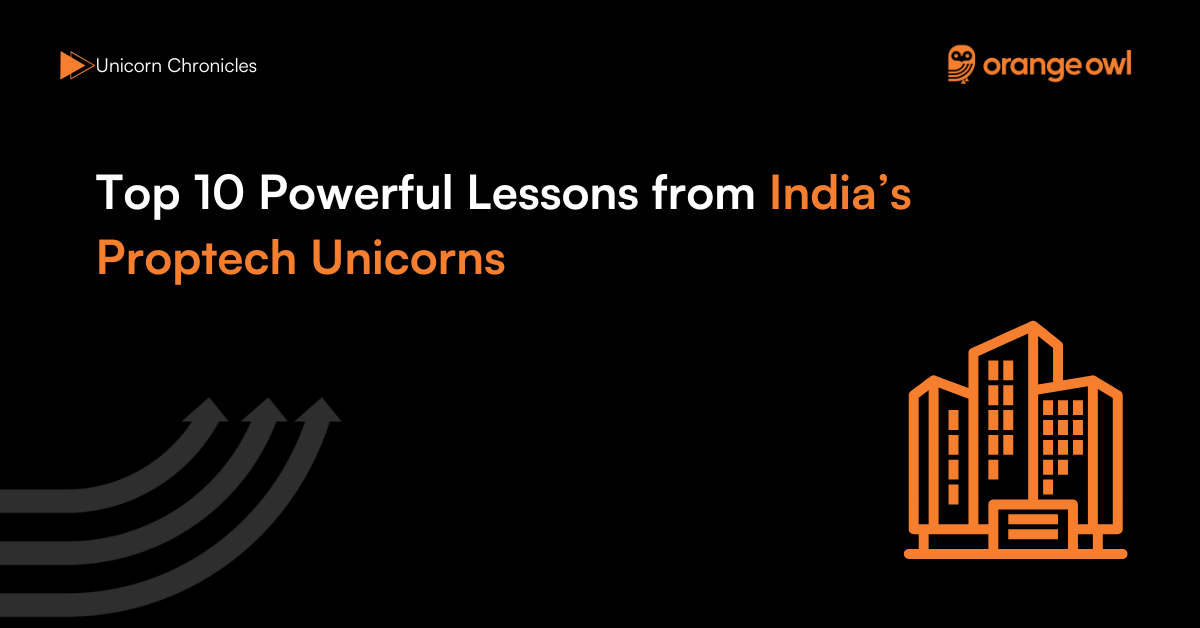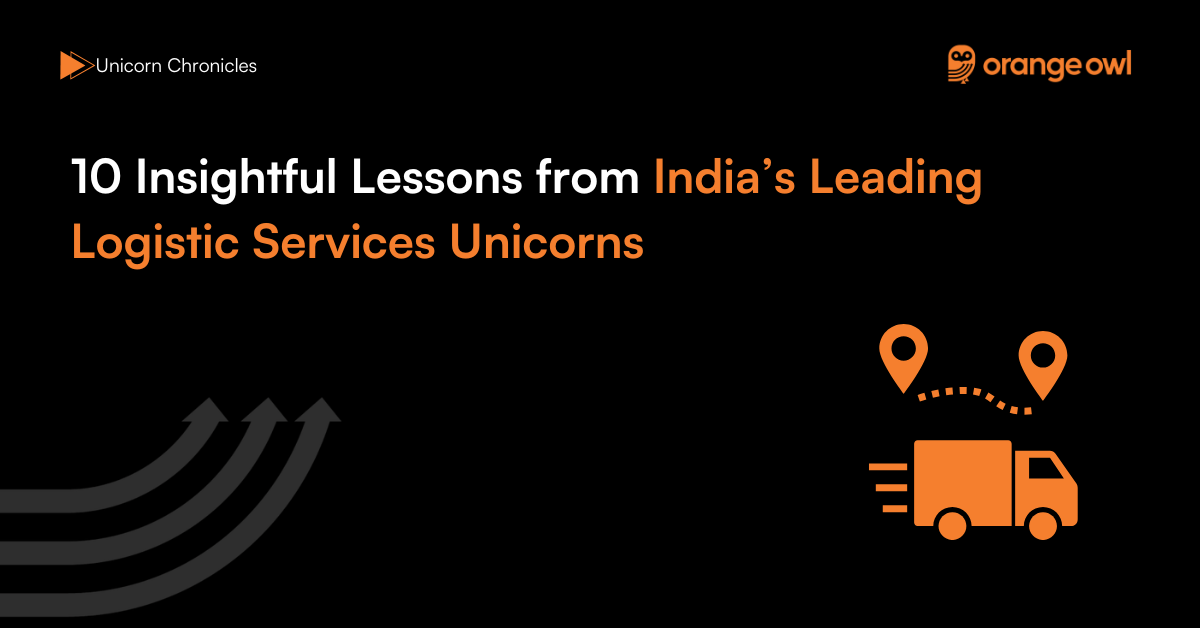Digit Success Story: 5 Insightful Lessons for Every Entrepreneur
Vivek Goel
May 12, 2025

Table of Contents
Introduction
In a sector traditionally known for complexity, fine print, and slow processes, Digit Insurance has emerged as a game-changer, revolutionizing how Indians perceive and interact with insurance. Long viewed as a confusing necessity filled with jargon and delays, insurance had failed to connect with the modern digital consumer. Enter Digit — a bold, tech-first company on a mission to “make insurance simple.”
Founded in 2016, Digit didn’t just seek to enter the market — it aimed to transform it from the ground up. By stripping away industry jargon, digitizing claims and policy management, and building a transparent, user-friendly experience, Digit has helped bring insurance into the mobile-first era. Today, whether you’re looking for health coverage, car protection, smartphone insurance, or even travel-related plans, Digit makes it accessible, fast, and frustration-free.
As of FY 2022–23, Digit Insurance recorded a Gross Written Premium (GWP) of ₹5,693 crore, reflecting consistent year-over-year growth.The company entered the unicorn club in 2021 with a valuation of $3.5 billion, backed by marquee investors including Fairfax Group and Sequoia Capital.
What sets Digit apart is not just its product suite, but its philosophy of customer empowerment. It understood that simplicity is not a compromise — it’s a competitive edge. In just a few years, Digit has scaled to become one of India’s fastest-growing insurtech unicorns, winning the trust of millions while reshaping the way insurance is sold and experienced.
Their journey is a lesson in how old-world industries can be disrupted with empathy, innovation, and fearless execution. And for entrepreneurs, it offers a blueprint for building something meaningful — even in the most traditional markets.
Origin Story
The story of Digit Insurance begins in 2016, when Kamesh Goyal, a seasoned insurance professional with over 20 years of experience in India and Germany, decided it was time to challenge the conventional playbook of the insurance industry. Having held leadership roles at global insurance giants and witnessed firsthand the gaps in customer experience, Kamesh envisioned an insurance company built not just on policies and premiums, but on trust, clarity, and customer empowerment.
Backed by Fairfax Holdings, a Canadian financial conglomerate led by the legendary investor Prem Watsa, Digit was born with a singular mission — “Make insurance simple.” But this wasn’t just a catchy tagline; it was a guiding principle that shaped every decision the company made.
Kamesh Goyal, in a candid interview, explained:
“We wanted to build a company that people could trust, and that began by simplifying insurance. We wanted our policies to be so easy to understand that even a 15-year-old could read and grasp them.”
This clarity of purpose drove the creation of a customer experience unlike anything the Indian insurance market had seen. From smartphone-enabled claim inspections and two-minute policy issuance to clear, jargon-free documentation, Digit was determined to rewrite the rules.
The founding team at Digit was a unique mix — combining deep-rooted domain expertise with a tech-first mindset. This blend enabled the company to innovate at speed while maintaining compliance with India’s strict insurance regulations. The team knew that reinventing insurance was not just about adding technology, but about rebuilding the experience from the customer’s point of view.
In just a short span, Digit moved from being a promising startup to a credible challenger in the insurtech space — not by making insurance flashy, but by making it accessible, transparent, and humane.
Business Landscape and Challenges
When Digit Insurance entered the market in 2016, it was stepping into a paradox — a $100 billion industry that remained largely untapped. Insurance penetration in India was shockingly low, with only around 3.5% of the population covered. Most Indians either saw insurance as an afterthought or distrusted it entirely, often associating it with tedious paperwork, complex terms, and unresolved claims.
The landscape was dominated by traditional giants — state-owned and private insurers with decades of presence and deep distribution networks. These legacy players relied heavily on agents and offline processes, with little urgency to innovate. To disrupt such an entrenched system was no small feat. Digit was not just introducing a product; it was introducing a new way of thinking about insurance.
One of the biggest early challenges was building credibility in a market that had long equated insurance with frustration. As a new digital-first entrant, Digit had to win over skeptical customers who were unsure if a completely online insurance process could be reliable or trustworthy.
Founder Kamesh Goyal reflected on this critical hurdle:
“In insurance, trust is not built overnight. We had to prove that digital could be safe, fast, and fair — and that required relentless focus on customer satisfaction.”
Digit understood that the product had to speak for itself. From day one, the team focused on delivering exceptional claims experiences, offering 24/7 support, and using clear communication to demystify policies. These customer-first efforts gradually turned early users into loyal advocates, helping build grassroots trust in a traditionally cynical market.
At the same time, navigating India’s regulatory landscape under the Insurance Regulatory and Development Authority of India (IRDAI) posed another major challenge. Every feature — from app-based claims to paperless policies — had to align with compliance guidelines without sacrificing user experience.
To solve this, Digit chose to build a strong in-house tech and compliance team instead of outsourcing. This allowed for agility in product development while maintaining rigorous adherence to legal standards. The result was a digital platform that was not only scalable and intuitive but also fully aligned with regulatory norms.
By addressing both trust and technology head-on, Digit turned its initial challenges into building blocks for long-term success.
Growth Strategies
Digit’s growth trajectory is a testament to smart execution, innovative product design, and an unwavering customer-first philosophy. From the very beginning, the company focused on building digital-first operations. This meant everything — from policy issuance to claims management — was designed to be smartphone-friendly.
In an industry notorious for its paperwork-heavy processes, Digit streamlined operations, allowing customers to manage their policies and file claims through simple app interfaces. This move not only enhanced the customer experience but also helped reduce operational costs, ensuring scalability.
Another significant growth strategy was simple product design. Unlike traditional insurance policies that are laden with legal jargon, Digit’s offerings were written in plain, easy-to-understand language. Policies were also modular, allowing customers to customize their coverage based on personal needs. This approach significantly lowered barriers to entry, making insurance accessible even to first-time buyers.
The company also embraced an effective B2B2C distribution model, partnering with popular platforms like Amazon, Flipkart, PolicyBazaar, and Paytm. This partnership allowed Digit to reach millions of customers through platforms they already trusted, thereby boosting visibility and making it easier for users to purchase policies online.
A crucial element of Digit’s success was its innovative approach to pricing and coverage flexibility. Instead of offering standard, one-size-fits-all premiums, Digit introduced variable pricing, where premiums were based on individual usage, behavior, and risk profiling. This approach helped customers feel more in control of their insurance plans while ensuring they paid only for what they needed.
The COVID-19 pandemic presented both a challenge and an opportunity for Digit. While many insurers slowed down, Digit took a bold step by launching COVID-specific health plans. These plans met the urgent need for coverage during a global health crisis, and the response was overwhelming, leading to a surge in customer acquisition. This move not only solidified Digit’s reputation but also highlighted its ability to pivot and innovate in times of uncertainty.
By FY 2022-23, Digit had insured over 30 million people, processed more than 2 million claims, and reported a Gross Written Premium (GWP) of over ₹5,000 crore, showcasing the effectiveness of its strategies.
Marketing Strategy
Digit’s marketing strategy was built around trust and clarity, rather than flashy advertisements or gimmicks. From the beginning, the company understood that trust is the cornerstone of insurance, and its marketing reflected this philosophy.
Customer testimonials and word-of-mouth played a pivotal role in Digit’s growth. With a high claim settlement ratio and a seamless service experience, customers became Digit’s best promoters, sharing their positive experiences with friends and family.
Another key element in Digit’s marketing strategy was its transparent communication. Unlike many of its competitors, Digit’s product pages were simple, honest, and free of jargon, which helped establish an immediate rapport with first-time buyers.
The company went out of its way to demystify insurance for customers, explaining terms in a way that was easy to grasp. This transparency not only built trust but also attracted a younger, more digitally savvy audience who appreciated the straightforward approach.
Digit also adopted targeted partnerships with digital-first companies. By teaming up with platforms like PolicyBazaar and Paytm, the brand gained access to millions of tech-savvy users who were already comfortable making online transactions. This strategic alignment enabled Digit to capture a broad audience and drive sales without relying on traditional distribution channels.
In addition to partnerships, content-driven education became a major pillar of Digit’s marketing efforts. The company invested heavily in creating blogs, explainer videos, and guides to help users make informed decisions about their insurance needs. This educational approach not only established Digit as a thought leader but also helped customers feel more confident in their choices.
Finally, Digit’s brand identity — cheerful, minimal, and helpful — resonated deeply with a younger demographic. The brand’s tone was always friendly and approachable, which made it stand out in a market often dominated by stiff, corporate messaging. This helped Digit connect emotionally with customers, making it more than just an insurance provider but a trusted ally in managing their future.
5 Insightful Lessons for Every Entrepreneur
1. Simplicity Wins in Complex Markets
One of the most profound lessons from Digit’s journey is the power of simplicity in an otherwise complex market. The insurance industry is notorious for its convoluted products, dense paperwork, and difficult-to-understand policies.
However, Digit proved that even such a traditionally complex market could be disrupted by making the experience clear and easy to navigate. By breaking down insurance into simple, bite-sized modules and using plain language, Digit made it accessible to all consumers, regardless of their experience with insurance.
As Kamesh Goyal puts it, “Simplicity is not the absence of depth, it’s the result of clarity.” For entrepreneurs, this is a critical reminder that simplifying processes doesn’t mean cutting corners; instead, it’s about making things clear and easy for your customers. Often, reducing friction is the greatest form of innovation.
2. Build Trust Through Transparency
Trust is often the hardest thing to earn in any industry, and for Digit, this was no exception. Insurance, by nature, involves risk and uncertainty, which makes customer trust essential.
Many insurers have earned a reputation for hidden charges, complicated terms, and sluggish claim processing. Digit tackled this head-on by being open, honest, and transparent about its processes, pricing, and policies.
Entrepreneurs should recognize that trust is not merely a soft skill but a growth metric that can directly influence customer loyalty and acquisition. As Kamesh Goyal shared, “In insurance, trust is not built overnight.”
Digit invested significant effort in making sure that their customers felt valued and informed at every touchpoint, building lasting trust in the process. For any entrepreneur, focusing on transparency in all aspects of business can lay a strong foundation for long-term success.
3. Leverage Tech to Create Delight, Not Just Efficiency
In today’s digital world, many companies use technology simply as a tool to cut costs or improve operational efficiency.
While this is a valuable use of tech, Digit took a more customer-centric approach by leveraging technology to delight its users. For instance, they introduced WhatsApp claim updates and a mobile app for damage assessment, making it easier for customers to interact with their insurance in real-time.
Digit didn’t just automate processes for the sake of efficiency; they used tech to create a seamless, enjoyable experience for their users. Entrepreneurs can learn from this approach by recognizing that tech should enhance customer satisfaction, not just drive down costs.
Whether it’s through personalized recommendations, quick updates, or interactive features, tech can be a powerful tool for making your customers’ journey more enjoyable.

4. Turn Adversity into Advantage
Digit’s approach to adversity is a prime example of how crises can spark innovation. When the COVID-19 pandemic hit, many insurers played it safe, pulling back and limiting their offerings.
Instead of following this conservative route, Digit turned the crisis into an opportunity by launching COVID-specific health plans — a move that resonated deeply with customers who were seeking protection during an uncertain time.
As Kamesh Goyal reflected, the pandemic forced the company to adapt quickly, and “crises often create windows for innovation”. Entrepreneurs should remember that times of adversity often create the best opportunities for growth.
By staying agile, taking risks, and responding to evolving customer needs, businesses can emerge stronger from challenges. Digit’s ability to pivot quickly and offer targeted solutions during a global crisis showcases the value of seeing opportunity even in the most difficult circumstances.
5. Go Where Your Customers Are
Digit’s B2B2C distribution model — where they partnered with Amazon, Flipkart, PolicyBazaar, and Paytm — is another smart strategy worth emulating. By focusing on deep integrations with platforms that already had a massive, tech-savvy user base, Digit was able to scale rapidly without significant marketing costs.
This approach helped the company avoid the need for massive advertising budgets, allowing them to reach millions of customers directly through platforms they were already familiar with.
For entrepreneurs, this lesson is clear: sometimes, the most effective distribution strategy isn’t about throwing money into ads but about meeting your customers where they already are.
By aligning with trusted platforms and tapping into established user bases, businesses can scale more efficiently and avoid the overhead costs associated with traditional marketing campaigns. In today’s world, strategic partnerships and smart distribution models often beat a big marketing budget.
Conclusion: Key Takeaways from Digit’s Journey
Digit Insurance’s journey is much more than a typical business success story; it serves as a powerful case study in rethinking how traditional industries can be transformed by embracing modern, customer-first approaches. In a market where established players often relied on slow, bureaucratic processes, Digit’s bold decisions and innovative thinking turned insurance into something accessible, understandable, and customer-centric.
By blending empathy, technology, and simplicity, Digit has set new benchmarks not just for the insurance industry, but for how businesses can redefine legacy systems in any sector. The company’s growth wasn’t about simply competing with existing players but about creating something entirely new — a product and service that resonated with the modern consumer’s demand for transparency, speed, and simplicity.
Entrepreneurs can draw numerous valuable lessons from Digit’s journey, especially when navigating complex industries. The key takeaway is that success doesn’t always require massive budgets or decades of tradition; instead, it’s about solving the right problems in the right way. Digit’s relentless focus on customer obsession, its willingness to experiment and innovate, and its ability to use technology to create value serve as the perfect blueprint for entrepreneurs looking to disrupt industries that have been around for a long time.
“You don’t need to be the biggest to make the biggest impact. You just need to solve the right problems the right way.” – Kamesh Goyal


